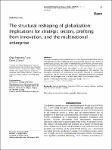Item Infomation
Full metadata record
| DC Field | Value | Language |
|---|---|---|
| dc.contributor.author | Petricevic, Olga | vi |
| dc.contributor.other | Teece, David J. | vi |
| dc.date.accessioned | 2020-09-15T03:25:06Z | - |
| dc.date.available | 2020-09-15T03:25:06Z | - |
| dc.date.issued | 2019 | - |
| dc.identifier.citation | https://doi.org/10.1057/s41267-019-00269-x | vi |
| dc.identifier.uri | http://tailieuso.tlu.edu.vn/handle/DHTL/9411 | - |
| dc.description.abstract | The rapid reshaping of the global economic order requires fundamental shifts in international business scholarship and management practice. New forms of protectionist policies, new types of internationalization motives, and new tools of techno-nationalism may lead to what we call ‘‘bifurcated governance’’ at the macro-level and ‘‘value chain decoupling’’ at the micro-level. As a result, innovation networks will require novel reconfigurations. We examine the emerging constraints on multinational enterprises, imposed by a bifurcated world order. We also discuss how the dynamic capabilities framework can guide scholars and managers alike to achieve new forms of evolutionary fitness. | vi |
| dc.description.uri | https://doi.org/10.1057/s41267-019-00269-x | vi |
| dc.language | en_US | vi |
| dc.publisher | Springer Nature | vi |
| dc.relation.ispartofseries | Journal of International Business Studies (2019), Volume 50, Issue 9, pp 1487–1512 | vi |
| dc.subject | shaping globalization trajectories | vi |
| dc.subject | MNE–host country relations | vi |
| dc.subject | profiting from innovation | vi |
| dc.subject | dynamic capabilities | vi |
| dc.title | The structural reshaping of globalization: Implications for strategic sectors, profiting from innovation, and the multinational enterprise | vi |
| dc.type | BB | vi |
| Appears in Collections: | Tài liệu mở | |
Files in This Item:
Bạn đọc là cán bộ, giáo viên, sinh viên của Trường Đại học Thuỷ Lợi cần đăng nhập để Xem trực tuyến/Tải về
Items in DSpace are protected by copyright, with all rights reserved, unless otherwise indicated.

